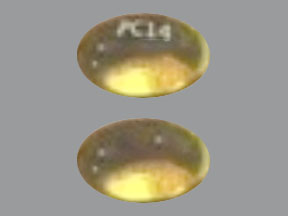Benzonatate
Generic name: benzonatate [ ben-ZOE-na-tate ]
Brand names: Tessalon Perles, Tessalon, Zonatuss
Drug class: Antitussives
What is benzonatate?
Benzonatate is a non-narcotic cough medicine.
Benzonatate works by numbing the throat and lungs, making the cough reflex less active.
Benzonatate is used to relieve coughing.
Warnings
You should not use this medication if you are allergic to benzonatate or topical numbing medicines such as tetracaine or procaine (found in some insect bite and sunburn creams).
Never suck or chew on a benzonatate capsule. Swallow the pill whole. Sucking or chewing the capsule may cause your mouth and throat to feel numb or cause other serious side effects.
Serious side effects of benzonatate include choking feeling, chest pain or numbness, feeling like you might pass out, confusion, or hallucinations. Some of these side effects may result from chewing or sucking on a capsule.
Do not give this medication to a child younger than 10 years old without medical advice. An overdose of benzonatate can be fatal to a child.
Before taking this medicine
You should not use this medicine if you are allergic to benzonatate or topical numbing medicines such as tetracaine or procaine (found in some insect bite and sunburn creams).
Tell your doctor if you are pregnant or breastfeeding.
Benzonatate is not approved for use by anyone younger than 10 years old. An overdose can be fatal, especially to a young child who has accidentally swallowed the medicine.
How should I take benzonatate?
Take benzonatate exactly as prescribed by your doctor. Follow all directions on your prescription label and read all medication guides or instruction sheets.
Always ask a doctor before giving a cough medicine to a child. Death can occur from the misuse of cough and cold medicines in very young children.
Take each dose with a full glass of water.
Never suck or chew on a benzonatate capsule. Swallow the pill whole. Sucking or chewing the capsule may cause serious side effects.
Store at room temperature away from moisture, heat, and light.
What happens if I miss a dose?
Skip the missed dose and use your next dose at the regular time. Do not use two doses at one time.
What happens if I overdose?
Seek emergency medical attention or call the Poison Help line at 1-800-222-1222. An overdose of benzonatate can be fatal, especially to a child. Accidental death has occurred in children under 10 years old.
Overdose symptoms may include tremors, feeling restless, seizure (convulsions), slow heart rate, weak pulse, fainting, and slow breathing (breathing may stop).
What to avoid
Avoid eating or drinking anything while you feel numbness or tingling in your mouth or throat.
Benzonatate side effects
Stop taking benzonatate and get emergency medical help if you have signs of an allergic reaction: hives; difficult breathing; swelling of your face, lips, tongue, or throat.
Call your doctor at once if you have:
-
severe drowsiness or dizziness;
-
confusion, hallucinations.
-
ongoing numbness or tingling in your mouth, throat, or face;
-
numbness in your chest;
-
a choking feeling;
-
chills; or
-
burning in your eyes.
Some of these side effects may result from chewing or sucking on a benzonatate capsule.
Common benzonatate side effects may include:
-
headache, dizziness;
-
itching, rash; or
-
stuffy nose.
This is not a complete list of side effects and others may occur. Call your doctor for medical advice about side effects. You may report side effects to FDA at 1-800-FDA-1088.
Related/similar drugs
Dosing information
Usual Adult Dose for Cough:
100 mg to 200 mg orally three times a day as needed for cough
Comments: This drug should be swallowed whole.
Use: Symptomatic relief of cough
Usual Pediatric Dose for Cough:
Children older than 10 years:
100 mg to 200 mg orally three times a day as needed for cough
Comments: This drug should be swallowed whole.
Use: Symptomatic relief of cough
What other drugs will affect benzonatate?
Using benzonatate with other drugs that make you drowsy can worsen this effect. Ask your doctor before using opioid medication, a sleeping pill, a muscle relaxer, or medicine for anxiety or seizures.
Other drugs may interact with benzonatate, including prescription and over-the-counter medicines, vitamins, and herbal products. Tell your doctor about all your current medicines and any medicine you start or stop using.
Frequently asked questions
More about benzonatate
- Check interactions
- Compare alternatives
- Pricing & coupons
- Reviews (789)
- Drug images
- Side effects
- Dosage information
- Patient tips
- During pregnancy
- Support group
- Drug class: antitussives
- Breastfeeding
- En español
Patient resources
Other brands
Professional resources
Other brands
Related treatment guides
Further information
Remember, keep this and all other medicines out of the reach of children, never share your medicines with others, and use benzonatate only for the indication prescribed.
Always consult your healthcare provider to ensure the information displayed on this page applies to your personal circumstances.
Copyright 1996-2025 Cerner Multum, Inc. Version: 11.01.

